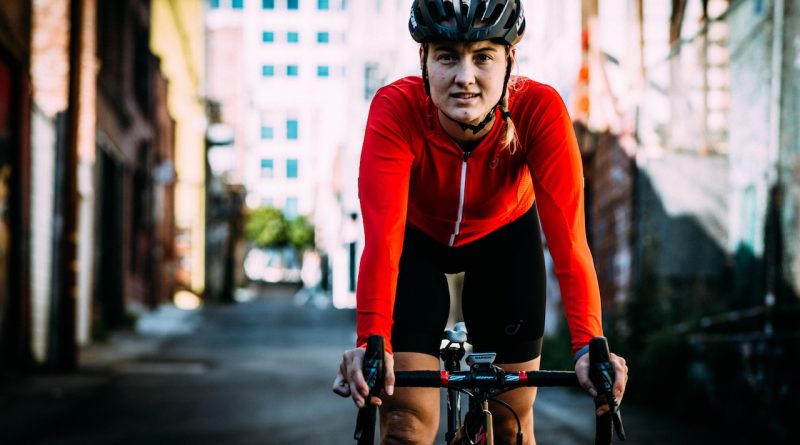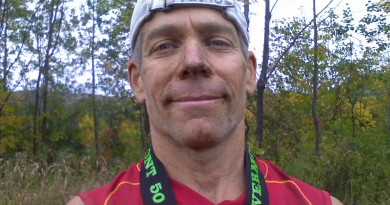Elle Anderson’s Secret Battle
Cyclocross star Elle Anderson didn’t know what she was in for when she moved in with this Belgian host.
When the weather turns cold, trails collapse into mud and rain coagulates into wet snow cyclocross racers smile. This is their season to ride, run and shoulder their bikes through the obstacles, terrain and weather the rest of us spend our lives avoiding.
“There’s always a little bit of pain and misery to cyclocross. It’s the fact that you are pushing yourself and fighting the elements that gives the sport its magic,” says Elle Anderson. She continues, almost gleefully, “I remember one race in Bend, Ore. It was 10 degrees and it had snowed two feet the day before. We raced on a course that was completely snow-covered and, in places, packed down so hard it was ice.” She pauses, then says as an afterthought, “I think I finished second.
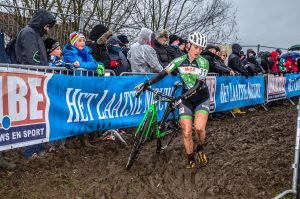
A former ski racer who grew up in Stowe and went to Burke Mountain Academy, Anderson is quickly emerging as one of the top cyclocross racers in America. In January, 2016, she placed fourth in the U.S. Nationals and went on, three weeks later, to take 14th in the Worlds in Belgium Then, in April 2016, she finished second in the U.S. National Criterium Championships. In summer, 2016, she placed third in Woodstock, Vt.’s Overland Grand Prix, a grueling 49-mile “adventure” ride on what can barely pass as trails, roads, pavé and singletrack. The year before, mountain bike legend Ned Overend placed sixth in that race.
Then, in January 2018, she was one of six women named to the Women’s Elite Team for the 2018 UCI Cyclocross World Championships in Valkenberg-Limburg, Netherlands in February, 2018. She placed 8th place. That performance earned her a spot on the USA Cycling National Team for 2018.
What is perhaps most remarkable is that Anderson, 30, was, until recently, going it alone: when she wasn’t working at her part-time job at Strava, she was her own manager, coach, logistics planner, PR and social media guru and bike mechanic. And she did so based in a foreign country: the epicenter of cyclocross racing, Belgium.
At the start of the 2017-2018 season, Anderson joined a Belgian cyclocross team sponsored by Milwaukee-Alpha Motorhomes.
Cyclocross is to Belgians what soccer is to Brits: a national spectator sport. “I will always remember that first race in Belgium,” she says. ” It was in late December in 2011—one of the really classic World Cups, in Namur, on one of the most challenging courses. It was like jumping into the very deepest end of the pool, there were so many steep drops and sharp turns. It was muddy and technical and there were literally tens of thousands of fans. I was scared—not just because the course was really hard but because there were all these people watching.”
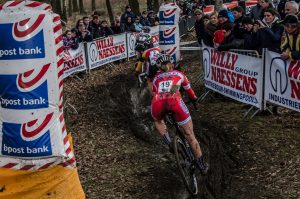 Instead of letting that deter her, Anderson embraced the challenge and decided to base herself out of Belgium for the 2014-15 living with strange families and racing on her own. She moved in with a cyclocross booster, Victor Bruyndonx and his mother—the same people who had housed Amy Dombroski, a 26-year-old national team member from Jericho, Vt., who was struck and killed by a car while on a training ride in Belgium in October, 2013.
Instead of letting that deter her, Anderson embraced the challenge and decided to base herself out of Belgium for the 2014-15 living with strange families and racing on her own. She moved in with a cyclocross booster, Victor Bruyndonx and his mother—the same people who had housed Amy Dombroski, a 26-year-old national team member from Jericho, Vt., who was struck and killed by a car while on a training ride in Belgium in October, 2013.
Anderson didn’t know much about her hosts before she moved in. “I didn’t know these people and I had no context over the phone or email but it seemed like a great opportunity.” She had faith in the fact that Dombroski had lived there. “Amy was the only connection. I really did feel like I could continue something and bring a piece of her on my journey. We both went to Burke, I always looked up to her and felt like—I still feel like—I am following her.” Instead of receiving the support that he might have offered, Bruyndonx, 77, verbally abused her. One night he was especially belligerent and grabbed her by the arm. She locked herself in her room and then, when she could, fled. She found another host home but she was shaken and soon sank into depression.
In mid-October, 2016, after a two-year investigation, Bruyndonx was arrested as a suspect in a global cocaine smuggling ring, according to a Belgian paper.
“The arrest was a relief, and not a surprise,” Anderson said. “I didn’t know about any cocaine when I was at Victor’s house but as soon as I moved out many people told me stories about it. I guess I suspected it but not when I was living there,” she said.
“When the shit went down, being all alone in a foreign country, not having anywhere to go, not having any sense of safety or anyone I could trust—my vulnerability was a result of the psychological game that he played,” she told Velo News’ editor Chris Case, who has written eloquently about her struggle.
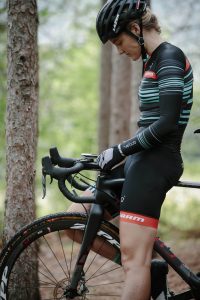 “It took me a lot of time to recover. It was a process that brought me to a really dark place. In the back of my mind I never did lose hope. I knew it was part of the process and I would get back to where I wanted to be. The hardest part was being patient. For three months I forced myself to ride my bike and I hated it, but I forced myself to.”
“It took me a lot of time to recover. It was a process that brought me to a really dark place. In the back of my mind I never did lose hope. I knew it was part of the process and I would get back to where I wanted to be. The hardest part was being patient. For three months I forced myself to ride my bike and I hated it, but I forced myself to.”
It was not the first time Anderson faced a setback. Growing up in Stowe, the daughter of Lyndall Heyer, a former World Cup racer and three-time Junior National Champion and Scott Dorwart, also a ski racer and a former member of the U.S. Cycling Team, Anderson (her last name is from her grandmother) seemed pre-destined to stand on podiums.
She grew up at the Ski Inn, the B&B her parents owned near Mt. Mansfield, helping her parents change the sheets between guests and listening to the race stories they told at night. “When I think back it was my choice to be a ski racer and my parents never pressured me. But growing up at the Inn where all of Mom’s trophies were displayed influenced me. I looked up to my Mom so much and wanted to be like her. “
Anderson spent six years at Burke Mountain Academy training to be a downhill racer but was sidelined when she blew out her ACL. She spent her senior year in rehab for the ACL, only to have it blow out again at the national championships. “It was a one-two punch,” she recalls, “I felt betrayed by the sport in a figurative sense.”
She was seven months out of surgery and only 80 percent of her way through rehab when she enrolled at Dartmouth. She had been riding her bike for rehab and by sophomore year, decided to put away the race skis and start riding in earnest. By her senior year, she had joined a cyclocross team out of Boston and in 2012 made it all the way to nationals. At that point, Anderson says, “I said to heck with road racing I am going to be a cyclocross racer.”
Anderson’s rise was meteoric, “That first nationals I believe I was lapped by Katie Compton and I only got to race for 20 minutes before I got pulled by the officials,” she says. But a year later she earned 12th place in the nationals and, in 2014, finished second.
After leaving Belgium at the end of the 2015 winter season, Anderson returned to her part-time job as a community manager for Strava, the software company in San Francisco where she’s been employed for the past five years.
“They’ve offered me more and more flexibility as I improve my racing. They come to the table rooting for me. As a company and a culture they want to see me succeed and encompass the brand identity. It’s a great position to be in and they are excited for what I am doing.”
She had been riding through the emotional pain, trying to stay on her game and working with a therapist on her depression.
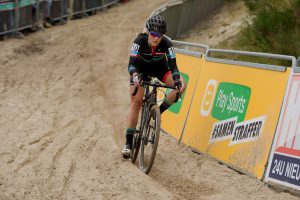
“As athletes, we are so driven and so hard on ourselves. It’s what pushes us to compete and succeed, it’s the driver,” Anderson says of her struggle. “You can’t turn it off, but it can hurt you too. It was driving me down instead of driving me up,” she says. “When I stopped ski racing it took me six months to forgive myself for turning my back on ski racing.”
Then came the breakthrough. “There was a moment late last summer when I finally gave myself permission to put the bike aside for however long it would take.”
And that was what it took. “I realized I had to let go and let my body heal. The turning point was letting go and forgiving myself and being compassionate to myself.” It took 6 weeks. “And all of a sudden I decided if I keep riding my bike someday it will feel normal again.”
“Normal” is back now and Anderson is back, traveling nearly every other week, competing in 40 to 50 races across the U.S., Belgium and around Europe.
So far, her finishes keep creeping upwards. In October 2016 she finished 3rd at the Kermiscross in Ardooie, Belgium, 13th at the World Cup and then 6th two days later at the Grand Prix Blueprint Woerden, both in the Netherlands. In 2017, she took 4th place at the Superprestige Series Overall in Belgium and 4th at the U.S. National Championships in Hartford, Conn. She took 8th place at the UCI World Championships in her first time competing in the series.
Anderson is based out of Belgium, once again, but this time with her Belgian husband, Niels. Most importantly, her passion is back. “I’m really excited,” she says. “Thinking about my journey from an outside perspective I could completely understand if I hadn’t gone back. Yet by some miracle, I still have that dream of competing in Europe. It’s like if you’re a ski racer and you didn’t go to Austria and ski race. Europe is the final frontier, the pinnacle and heartland of cyclocross and to be anywhere else would be less satisfying.”
She also came into the 2016-2017 season with a new perspective. “To be able to compete in a sport is such a privilege and it never really lasts for as long as we want it to last: It’s a gift for a short precious time. What happened last summer allowed me to dig even deeper, to gain that perspective and to be grateful for everywhere I’ve been.”
You can follow Elle Anderson’s racing at www.elleanderson.us or on her page on Facebook.
This story was last updated on November 10, 2018.

